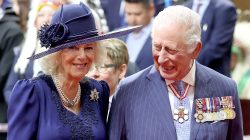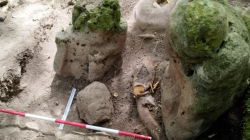You might remember last week’s Battle of Britain piece in PostScript, which highlighted the story of two English women who encountered a German pilot after he crash-landed in a nearby field. They immediately offered him a cup of tea, showcasing how deeply rooted this custom is within British culture. Although this event took place 85 years ago, contemporary Britons would still likely appreciate such hospitality with a “cuppa.”
Across the world, tea serves multiple purposes as more than just a nourishing drink—it offers therapeutic benefits as well. The 19th-century British politician William Gladstone once observed: “Should you feel chilled, tea can provide warmth; when overheated, it cools you down; feeling low? It lifts your spirits; overly agitated? It soothes you.” This makes having tea at home seem quite advantageous indeed.
The Beatles had a particular fondness for tea, particularly John Lennon, who allegedly consumed up to 20 cups daily. Paul McCartney composed a tune titled English Tea, starting with the lyrics, “Would you care to join me for an English cuppa?” Meanwhile, author Lewis Carroll—whose real name was Charles Dodgson—included whimsical tea gatherings in his work, possibly drawing inspiration from these events for the comical scene at the Mad Hatter’s tea party featured in “Alice’s Adventures in Wonderland.”
Tolong support kita ya,
Cukup klik ini aja: https://indonesiacrowd.com/support-bonus/
Another avid tea enthusiast is J.K. Rowling, the author of the “Harry Potter” series, who allegedly goes through as many as nine cups daily during her writing sessions.
Maybe best capturing the essence of tea’s role is this piece of graffiti: “If tea can’t solve it, it might be a big issue.”
Tea at the palace
George Orwell, an admirer of tea himself, penned a fervent piece titled “A Nice Cup of Tea” for the Evening Standard back in 1946. In his writing, he emphasized that “a single potent cup of tea surpasses twenty insipid ones.” He even hailed the beverage as one of the fundamental pillars supporting civilization in Britain.
A significant figure for Britain was the late Queen Elizabeth II, known for her love of tea, favoring blends like Earl Grey and Darjeeling. It appeared quite appropriate that mere weeks before her demise in 2022, she participated in the charming “tea at the palace” skit alongside Paddington Bear. During this lighthearted encounter, they enjoyed tea and marmalade sandwiches together; however, the bear momentarily embarrassed himself by sipping directly from the teapot’s spout.
Teabag turmoil
During the 1950s in Britain, there was a significant shift in how people enjoyed their tea with the arrival of teabags. However, these had been available for quite some time in the United States.
My mother was a staunch advocate of using loose leaf tea and originally felt quite uncomfortable with the introduction of teabags, deeming them somewhat uncouth. Eventually, though, she came to appreciate their convenience over dealing with fussy tea leaves. Nevertheless, I can vividly remember her offering apologies to guests whenever she served them teabags, as if this practice reflected poorly on us.
To conclude with an observation about teabags made by Nancy Reagan during her time as First Lady, she might have borrowed this thought from Eleanor Roosevelt: “A woman is akin to a tea bag; one can’t discern her strength until immersing her in boiling water.”
Cheeky monkeys
During the 1960s and 1970s in Britain, television was saturated with tea commercials. One of the most unforgettable ads featured Brook Bond Tea, known for its slogan “the tea you can really taste.” This campaign stood out because it utilized chimpanzees alongside humorous voiceovers provided by talents such as Peter Sellers and actors from the Carry On series.
In an advertisement, accompanied by James Bond-themed music, a chimpanzee dressed elegantly in a pristine white tuxedo with a black bow tie strides into a room and proclaims suavely, “I am Bond, Brook Bond.” In another spot, a tired British chimpanzee rides through the Tour de France as he looks at the crowd and, speaking with a pronounced Northern England dialect, queries, “Do you have a cup of tea?”
Typhoo tea joined the fun in the 1980s with “You only get an ‘OO’ with Typhoo”, a daft series of ads featuring Frankie Howerd and Cilla Black.
Perhaps it was the monkeys who were behind the graffiti in London that said, “Coffee is not my cup of tea.”
Lucky dip
After last week’s piece on house lizards (jing-joks), I received a letter sharing another personal encounter with one. The individual was unwinding with a cold beverage when they noticed something amiss after taking a sip. Upon inspecting their drink more closely, they found a jing-jok performing what looked like the front crawl inside it. Apparently, the lizard must have fallen from the overhead surface. At the very least, it chose an interesting spot to make impact.
Seeing red
A week ago, I overlooked mentioning the jing-joks’ most notable moment when they grabbed the headlines. Arguably, this was their peak as they were held responsible for one of Bangkok’s most severe traffic congestion events ever recorded, which indeed speaks volumes.
Following a grueling day of nightmarish traffic congestion in Bangkok back in 1997, an inquiry was launched to determine the cause of the chaotic conditions. The blame was ultimately placed on the hapless jing-jok.
Based on the report, jing-joks were partying within the computerized control system of the traffic lights and caused chaos, leading to green lights turning red and vice versa.
Drivers felt reassured upon learning that the heavy traffic jam was not due to any negligence on the part of the traffic officers managing the signals.
Provided by Syndigate Media Inc. (
Syndigate.info
).




